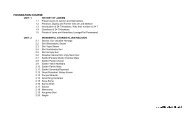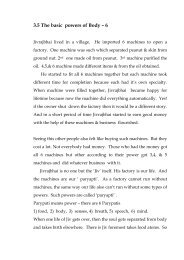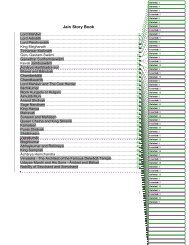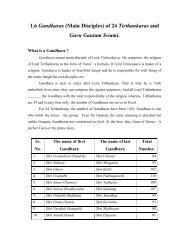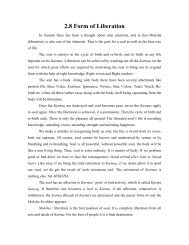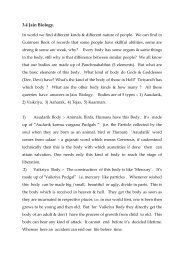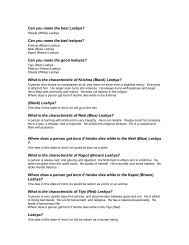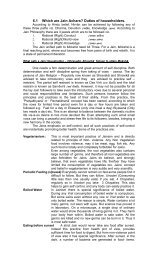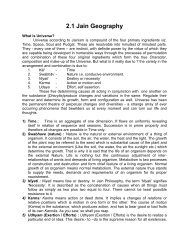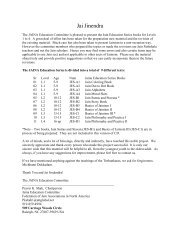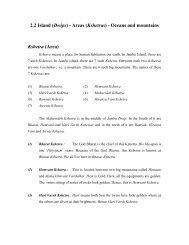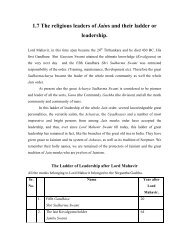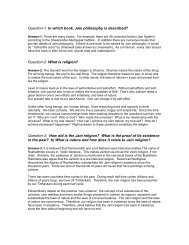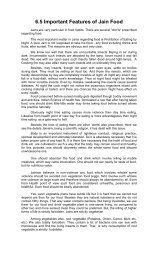Paryushan Parva - Jainism, Jain Religion - colleges
Paryushan Parva - Jainism, Jain Religion - colleges
Paryushan Parva - Jainism, Jain Religion - colleges
You also want an ePaper? Increase the reach of your titles
YUMPU automatically turns print PDFs into web optimized ePapers that Google loves.
Pratikraman in English with Meaning<br />
Going Back to the Path of Purification<br />
Lesson 21 – Twelve Penances 22<br />
I reflect on and confess any sinful wrong-doings (Atichär) related to penance of a long or short<br />
duration. In spite of ability, I might not have performed the twelve penances consisting of six<br />
external penances, viz., fasting, taking less food, taking fewer food items, abstention from specific<br />
taste, straining the body, and to restrain passions like anger; and six internal penances, viz.,<br />
atonement of sin, politeness, service to ascetics, study of scriptures, meditation, and giving up of<br />
bodily activities. If at all I had practiced them I might have practiced for this worldly or other<br />
worldly happiness, or with the hope of getting fame, or done it out of jealousy. I might not have<br />
performed penance in spite of I was fit to do so or performed it just to fulfill the oath I had taken<br />
before a god. I might have felt proud after performing the penance or resorted to self-praise after<br />
performing it.<br />
If I have indulged in any of the above faults or lapses by physical, verbal or mental activities,<br />
directly or indirectly, then I pray that my such faults be dissolved. TASSA MICHCHHÄ MI<br />
DUKKADAM.<br />
Lesson 22 – Energy (Vigor) 23<br />
I reflect on and confess wrong-doings (Atichär) related to energy or strength. If I am guilty of any<br />
wrong-doings (Atichär) of this matter, I request to be forgiven and my sins nullified.<br />
I might have been guilty of dissipated the energy or strength of the mind through sinful activities of<br />
the mind, or the energy or strength of speech through untruthful activities of the speech, or the<br />
energy or strength of the body through wicked activities of the body.<br />
From my birth until today, and in previous lives, if I have been guilty of breaking or offending<br />
against any vow, whether I took it or not; knowingly or unknowingly; either by day or at night, by<br />
physical nature of activity, place, time or desire either partly or wholly; if I have been guilty of<br />
thinking of committing sins, of preparation for the commission of such sins, of attempting to<br />
commit such sins, or of actual commission of the sins, or otherwise, been guilty either by thought,<br />
speech, or action, or made someone else guilty or approved of any such lapse or guilt, then keeping<br />
the infinite Arihants, the Siddhäs, and the revered Kevalis 24 as my witnesses, I wish to be forgiven<br />
22 In Prakrut, it called Tapa. To cease to have desire is called Tapa. Tapa means hardship on one’s body, senses and<br />
mind, practiced to develop adequate spiritual abilities for reducing passions. Bodily activities are dominant in the<br />
external austerities, and mental activities are dominant in the internal austerities. There are twelve types - six external<br />
tapa: 1) Anasan - complete abstinence of eating and drinking, 2) Unodari or Alpähära - reduction in the quantity of<br />
food one normally eats, 3) Vrutti-Samkespa or Ichhänirodha - control of desire for food and material things, 4)<br />
Rasatyäga - complete abstinence of eating or drinking juicy and tasty foods such as honey, alcohol, butter, milk, tea,<br />
sweets, juice etc. (no attachments to the taste of the foods), 5) Käyäklesa – to train the body to be tolerant and 6)<br />
Samlinatä – control of the pleasures of five senses. Six internal tapa: 1) Präyaschita - repentance for the breach of vows<br />
2) Vinaya - appropriate behavior towards a teacher 3) Vaiyävrata - selfless service to the suffering and deserving 4)<br />
Svädhyäya - studying/listening of religious scriptures 5) Dhyäna - religious meditation and 6) Utsarga (käyotasarga) -<br />
non-attachment to the body.<br />
23 Energy (virya) is an important quality of the soul. Amount of proper Darshan and Jnäna is dependent on the amount<br />
of the energy and quality of its use. Energy is the operator of the knowledge and the perception. Impure energy can<br />
generate the vibration that attracts new karma. Efficient use of the energy can shed the karma. Energy can be expressed<br />
as the capacity of the soul to give (Däna), receive (Läbha), enjoy (Bhoga) and re-enjoy (Upbhoga). Pure, proper and<br />
unlimited use of energy stops the influx of karma and sheds the bondage of karma, and soul realizes unlimited<br />
consciousness (Darshan and Jnäna). Thus, the consciousness is the major element, energy is the operator of bondage to<br />
karma and the happiness is the effect.<br />
24 Kevali – are those who have eradicated four defiling (ghäti) karma, but they are not tirthankars.<br />
25



